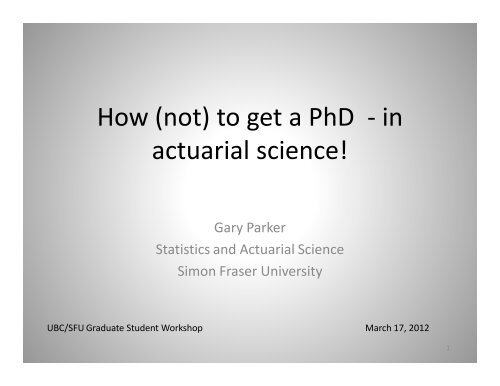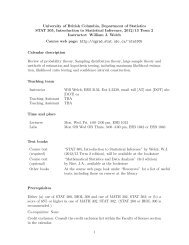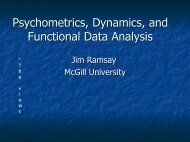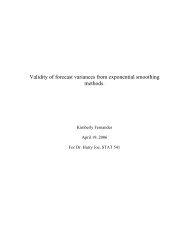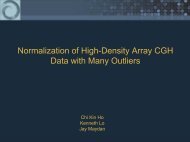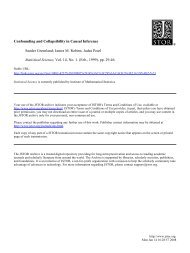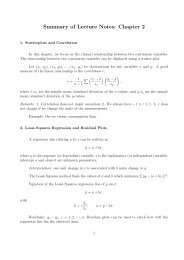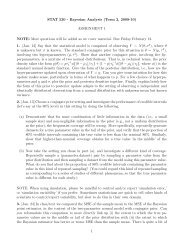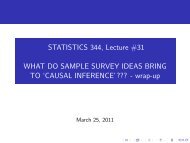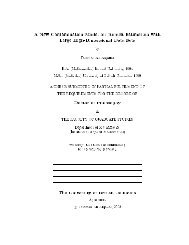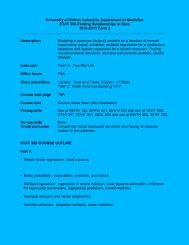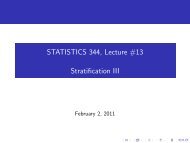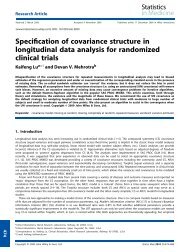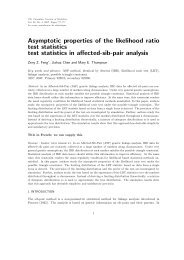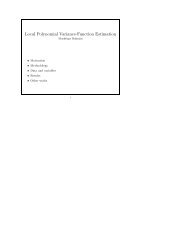How (not) to get a PhD - in actuarial science! - Department of Statistics
How (not) to get a PhD - in actuarial science! - Department of Statistics
How (not) to get a PhD - in actuarial science! - Department of Statistics
Create successful ePaper yourself
Turn your PDF publications into a flip-book with our unique Google optimized e-Paper software.
Outl<strong>in</strong>e• Ten well-established ways <strong>of</strong> <strong>not</strong> <strong>get</strong>t<strong>in</strong>g a <strong>PhD</strong> (MSc)• Research <strong>in</strong> <strong>actuarial</strong> <strong>science</strong>• References:– HOW TO GET A <strong>PhD</strong> - A handbook for students and their supervisors, 4 th Ed.By ESTELLE M. PHILLIPS and DEREK S. PUGH, Open University Press– <strong>How</strong> <strong>not</strong> <strong>to</strong> <strong>get</strong> a <strong>PhD</strong>.http://www.guardian.co.uk/education/2002/nov/08/highereducation.books– 10 easy ways <strong>to</strong> fail a <strong>PhD</strong>http://matt.might.net/articles/ways-<strong>to</strong>-fail-a-phd/– http://www.soa.org/files/pdf/research-current-projects.pdf2
1. Not want<strong>in</strong>g a <strong>PhD</strong>• “Want<strong>in</strong>g” a <strong>PhD</strong>– S<strong>in</strong>gle-m<strong>in</strong>ded– Will<strong>in</strong>gness <strong>to</strong> discover what it takes - realistically– Determ<strong>in</strong>ation• “Want<strong>in</strong>g it” is important <strong>in</strong> difficult times– Po<strong>in</strong>tless tasks– When you ask yourself “Why I am do<strong>in</strong>g this?”– Interest <strong>in</strong> research and enjoyment <strong>of</strong> discuss<strong>in</strong>g itis <strong>not</strong> sufficient4
2. Not understand<strong>in</strong>g the nature <strong>of</strong> a<strong>PhD</strong> - Overestimat<strong>in</strong>g• Do<strong>in</strong>g normal research– Orig<strong>in</strong>al contribution <strong>to</strong> knowledge• Major contributions– A strategy for <strong>get</strong>t<strong>in</strong>g an honorary degree• Paradigm shifts– After the <strong>PhD</strong>• Real/Practical research– Really <strong>in</strong>novative but…– Requires strong knowledge and a long time5
3. Not understand<strong>in</strong>g the nature <strong>of</strong> a<strong>PhD</strong> - Underestimat<strong>in</strong>g• A <strong>PhD</strong> requires a contribution <strong>to</strong> knowledge• It means f<strong>in</strong>d<strong>in</strong>g good questions as well as <strong>in</strong>terest<strong>in</strong>ganswers• Underestimation:– Just a full description <strong>of</strong> a ‘real’ problem– Write-up <strong>of</strong> your knowledge– Career strategies (consult<strong>in</strong>g bus<strong>in</strong>ess, book, …)– Aim for the weakest student <strong>in</strong> your department• This leaves no room for uncerta<strong>in</strong>ty; and research is ???• At risk:– Study<strong>in</strong>g part-time– Keep<strong>in</strong>g your job– Com<strong>in</strong>g back <strong>to</strong> academic life after some time <strong>in</strong> the ‘real world’6
4. Supervisor <strong>not</strong> know<strong>in</strong>gwhat a <strong>PhD</strong> requires• Supervisor must <strong>not</strong> over- or underestimate a <strong>PhD</strong>• Penalties: much greater for student than supervisor– Student must <strong>get</strong> the supervision he/she needs and isentitled <strong>to</strong>• Overestimation:– Challenge the students– Shake them up– Br<strong>in</strong>g new ideas– Treat them as adults (<strong>in</strong> research terms!)• Underestimation:– Let students work by themselves7
6. Not hav<strong>in</strong>g a thesis• A thesis must be:– M<strong>in</strong>imum and maximum # <strong>of</strong> pages– Paper size (letter, A4)– Marg<strong>in</strong>s, font size and color– B<strong>in</strong>d<strong>in</strong>g• A <strong>PhD</strong> thesis must– Argue a position– Have a s<strong>to</strong>ry l<strong>in</strong>e, with relevant arguments– Be coherent, organized, …9
7. Tak<strong>in</strong>g a job before f<strong>in</strong>ish<strong>in</strong>g• Do<strong>in</strong>g a <strong>PhD</strong> is <strong>in</strong>tellectually demand<strong>in</strong>g• Writ<strong>in</strong>g up demands the most concentrated effort• Reasons:– Emotional: A chore after do<strong>in</strong>g the ‘real’ work– Intellectual: a lot <strong>of</strong> adjustments need <strong>to</strong> be done– Limitations: writ<strong>in</strong>g skill, experience• Tak<strong>in</strong>g a job while writ<strong>in</strong>g up can– Lead <strong>to</strong> <strong>in</strong>tellectual fatigue– Put <strong>of</strong>f completion (possibly years)– Result <strong>in</strong> you <strong>not</strong> <strong>get</strong>t<strong>in</strong>g a <strong>PhD</strong>10
8. Focus on Grades• Does anyone care about grades <strong>in</strong> grad school?Optimal GPA = M<strong>in</strong>imum Req’d GPA + ε• Some <strong>PhD</strong> students “want <strong>to</strong> learn”– <strong>PhD</strong> <strong>in</strong>volves a lot <strong>of</strong> learn<strong>in</strong>g but …– Focused learn<strong>in</strong>g <strong>in</strong>stead <strong>of</strong> try<strong>in</strong>g <strong>to</strong> learn everyth<strong>in</strong>g– “Eternal” students• Coursework and GPA are important <strong>to</strong> fixadmissions mistakes and award scholarships11
9. Procrast<strong>in</strong>ate• Grad schools attract procrast<strong>in</strong>a<strong>to</strong>rs• Perfectionists and ‘eternal’ students tend <strong>to</strong>procrast<strong>in</strong>ate– Polish research papers– Not able <strong>to</strong> write until they have the paperperfectly mapped out12
10. Ignore your committee• Committee has <strong>to</strong> sign <strong>of</strong>f on your <strong>PhD</strong>• Easy <strong>to</strong> for<strong>get</strong> comments from a committeemember but he/she rarely for<strong>get</strong>s• Can disagree, argue, defend but <strong>not</strong> always agood idea <strong>to</strong> look for excuses or ignore advice13
Actuarial Research• Theoretical and Practical• Examples <strong>of</strong> current SoA research projects– F<strong>in</strong>ance• impact <strong>of</strong> the subprime mortgage crisis on <strong>in</strong>surers• <strong>in</strong>vestment strategies <strong>in</strong> an economic downturn• impact <strong>of</strong> baby boomers on f<strong>in</strong>ancial security systems– Risk Management• Climate change volatility <strong>in</strong>dex• Risk models for <strong>in</strong>surance regula<strong>to</strong>rs• Enterprise risk management• Emerg<strong>in</strong>g risks14
Actuarial Research– Health• Fac<strong>to</strong>rs driv<strong>in</strong>g long-term disability• End-<strong>of</strong>-life issues <strong>in</strong> health care• Hedg<strong>in</strong>g LTC products– Life <strong>in</strong>surance• Liv<strong>in</strong>g <strong>to</strong> 100; mortality projections and impact on social,f<strong>in</strong>ancial, <strong>in</strong>surance systems• Expense studies• Re<strong>in</strong>surance• Extreme events risk• Embedded value• Persistency studies15
Actuarial Research– F<strong>in</strong>ancial report<strong>in</strong>g• Discount<strong>in</strong>g process for report<strong>in</strong>g• Credit risk model<strong>in</strong>g– Retirement• Replacement ratios• Impact <strong>of</strong> <strong>in</strong>sufficient retirement sav<strong>in</strong>gs– Other• Experience studies: LTC, Cancer survival table, group disability andbenefits, Morbidity, underwrit<strong>in</strong>g, etc• VA• Guaranteed benefits• Predictive model<strong>in</strong>g• Multi-period risk measurement, dynamic risk management, ALM• Confidence <strong>in</strong>terval for CTE• Claims reserv<strong>in</strong>g16


